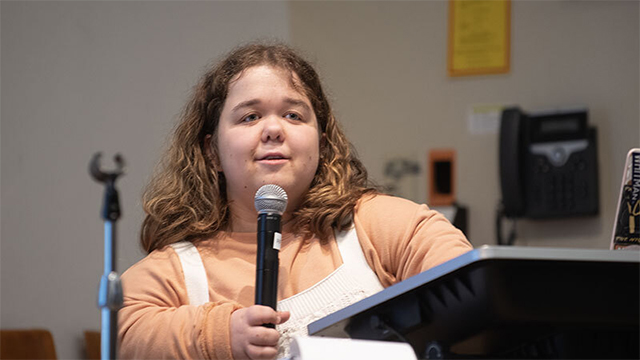March 1, 2023: Women’s History Month and Disability Awareness Month

Feature by John Johnson, Vice President for Diversity and Inclusion:
March 1st marks the start of both Women’s History Month and Disability Awareness Month.
Established in 1987 as a month to “recognize and celebrate people with disabilities and to encourage expanding opportunities for all people,” Disability Awareness Month helped pave the way for the passing of the Americans with Disabilities Act (ADA) in 1990. The ADA language (excerpt provided below) articulates the way disabled people are adversely impacted by ableism and discrimination in their daily lives.
“Physical or mental disabilities in no way diminish a person’s right to fully participate in all aspects of society, yet many people with physical or mental disabilities have been precluded from doing so because of discrimination; others who have a record of a disability or are regarded as having a disability also have been subjected to discrimination. Historically, society has tended to isolate and segregate individuals with disabilities, and, despite some improvements, such forms of discrimination against individuals with disabilities continue to be a serious and pervasive social problem. Discrimination against individuals with disabilities persists in such critical areas as employment, housing, public accommodations, education, transportation, communication, recreation, institutionalization, health services, voting, and access to public services. Individuals with disabilities continually encounter various forms of discrimination, including outright intentional exclusion, the discriminatory effects of architectural, transportation, and communication barriers, overprotective rules and policies, failure to make modifications to existing facilities and practices, exclusionary qualification standards and criteria, segregation, and relegation to lesser services, programs, activities, benefits, jobs, or other opportunities ...”
Last week, several of the student-led Power & Privilege sessions focused on disability. Megan Taylor's session on navigating mental health as a disabled athlete, Kate Moe’s discussion of the intersection of reproductive justice and disability justice, Ahmed Elsayed’s analysis of media depictions of mental illness, and Sueli Bruni Gwiazdowski’s session with Professor Lydia McDermott engaged Critical Disability Studies and crip theory—all engaged the subject from different lenses.
Over the last few years, there has been an increased focus on ableism and accessibility at Whitman. The 2021 Community Learning Day session, the 2022 P&P keynote by Imani Barbarin, and the more recent Third Space Speaker session on Critical Disability Studies are just a few of the community efforts to increase awareness and build commitment to dismantling ableism at the institution. In fall of 2021, Whitman created the College Accessibility Committee. That committee, which includes representation from the Office of Equity and Compliance, Human Resources, Facilities, the Academic Resource Center, the student affinity group for disabled students, and the Division of Diversity and Inclusion, has been working to coordinate institutional efforts to address issues related to disability and inclusion. The committee is currently reviewing an external audit of all campus buildings and prioritizing structural modifications needed to make the campus ADA compliant and is putting together a small delegation for the AHEAD conference in July. An opportunity for community feedback on accessibility concerns and priorities will occur later in the semester and an update on the status of the committee’s work will be provided at the end of the semester.
Women’s History Month, like Black History Month, began initially as a week of recognition. Starting in 1982, the Congress of the United States established Women’s History Week and in 1987 the week was expanded to a month and is recognized in a variety of ways across the country. The Library of Congress, National Archives and Records Administration, National Endowment for the Humanities, National Gallery of Art, National Park Service, Smithsonian Institution and United States Holocaust Memorial Museum are all commemorating and encouraging focused learning about the contributions of women during the month. A robust collection of online materials have been produced by the National Park Service related to the month.
In our region, The Donald Blake Center for the study of Race, Ethnicity, and Culture at Walla Walla University has collaborated with campus and community partners on an International Women’s Day event scheduled for March 8, 2023. Walla Walla University will host a screening of the acclaimed film “Dolores.” The event will include a short program featuring Mayor of College Place Norma Hernandez, WWU Professor Deisy Haid, and local attorney Bertha Clayton. The program and screening will take place at 7 p.m. in the Winter Educational Complex, Room 209 at SW 4th Street in College Place, Washington. Refreshments will be served.
Last year around this time, Professor Susanne Beechey provided content to acknowledge the historic confirmation of Justice Ketanji Brown Jackson to the U.S. Supreme Court. Since then, the Dobbs decision has reminded us of the fragility of our rights and last week’s P&P keynote by Loretta J. Ross reminded us of our human rights. Ross’ lecture provided insights into the reproductive justice framework and can be accessed online here using the access code PP23Keynote. The reproductive justice conversation continues tomorrow with the Gender Studies Research Roundtable. The panel “Toward Reproductive Justice” will take place on Thursday, March 2, from 4–5:30 p.m. in Olin Auditorium and feature visiting scholars Chris Barcelos, Sharon Yam and our own Susanne Beechey.